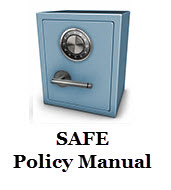|
|
State Accounting Fiscal Essentials . SAFE Policy Manual |
Revised: 03/28/2024 |
|
|
State Accounting Fiscal Essentials . SAFE Policy Manual |
Revised: 03/28/2024 |
Applicable or Related Code Sections
ORC 126.08 - Director of budget and management - powers and duties
OAC 123:1-39-07 - Tuition reimbursement
ORC 2743.19 - Enforcing and paying judgment and interest
Related Links
Ohio Ethics Advisory Opinion # 91-010
![]()
The Office of Budget and Management (“OBM”) generally evaluates each agencies’ expenditures for legality. This policy sets out guidelines for purchases agencies are permitted to make.
This policy applies to all state agencies, boards, and commissions for expenditures made from funds within the state treasury.
Agencies may only make purchases if they are for a public purpose and necessary for the performance of an agency function. Any purchases that could be considered solely personal in nature cannot be procured with state resources. Agency procurement and finance staff must be familiar with and follow all applicable state and federal laws and rules, including any additional restrictions tied to spending, such as specific appropriation language or limitations in grant agreements, to ensure that funds are legally spent. Agency chief fiscal officers should consult their legal counsel if there is any question about whether a purchase is solely personal in nature.
Agencies may take advantage of rebates and reward programs or cards (e.g., flyer mileage, fuel points, shopper’s card) only if the benefits are used for official state business. No person may benefit personally from any reward program or rebate.
Agencies must be diligent in scheduling events, flights, meals, trainings, etc. to ensure they are committing to only obligations that are used. When possible, agencies should negotiate a cancellation clause with suppliers prior to obligating funds and cancel reservations in a timely manner when individuals are unable to attend. When the agency is legally required to pay for a cancellation, the agency shall document approval of the payment by the head of the agency or legal counsel.
An agency should only pay a supplier after the supplier has provided the good or service free of defect.
There are limited circumstances in which pre-payment is permissible. The time between the pre-payment and the actual receipt of the good or service should be minimized. The following are limited exceptions to the prohibition on pre-payments:
Real estate, rent, and leases
Agencies cannot pay or reimburse an employee, for the cost of exams, tests or licenses when those expenses are necessary to obtain the stated minimum qualifications of the employee's position for initial employment with the state, unless otherwise permitted by law.
Agencies may pay or reimburse fees for special admissions, licenses, registrations or certifications that are necessary for an employee to fulfill the particular responsibilities of the position, as well as the cost of continuing education, seminars and conferences attended by agency employees when the agency determines the expenditures to be appropriate and related to the employee's position.
While agencies may pay membership fees, any membership for an employee paid by the agency must benefit the agency. Memberships should be made in the name of the agency benefiting from the membership whenever possible.
Individual drivers are responsible for all traffic and parking violations when they are using an assigned state vehicle or personal vehicle while on state time.
